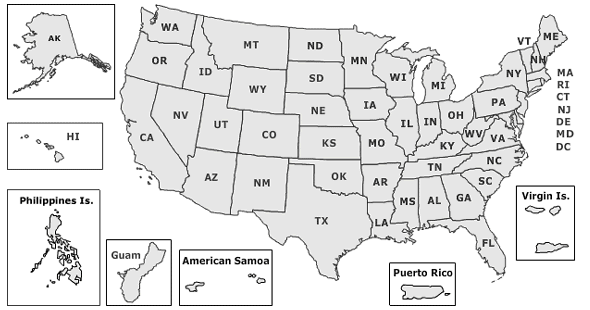NewsFlash | Service Dogs
Service Dogs
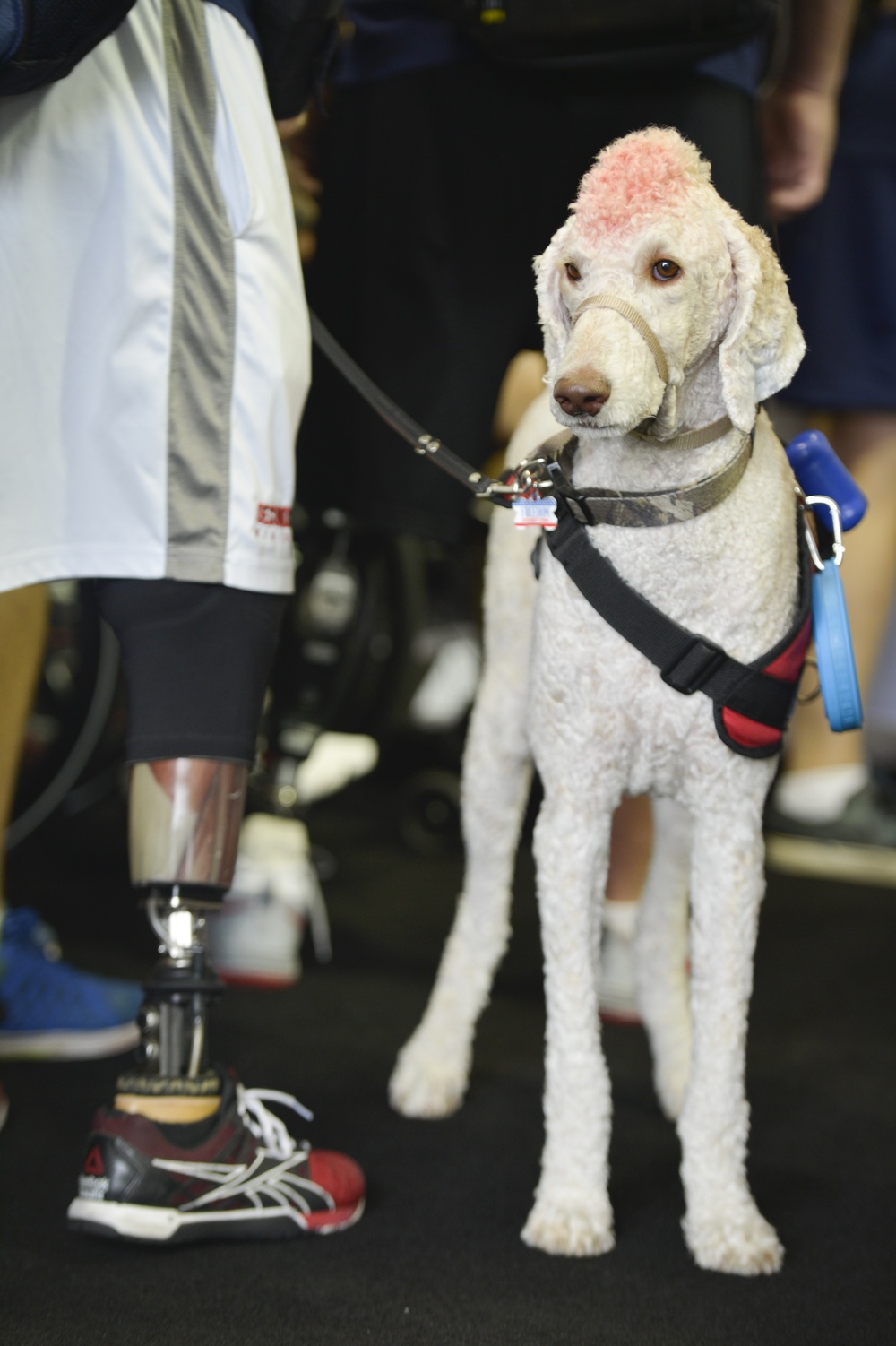 Service Dogs — Service dogs are guide or service dogs prescribed for a disabled Veteran for the purpose of the Veteran being diagnosed as having a visual, hearing, or substantial mobility impairment. VA’s authority for Service Dogs (guide, hearing, seizure, and mobility dogs) is in 38 CFR 17.148 - Service Dogs. VA provides a veterinary health insurance benefit and other benefits in support of service dogs to maximize the life and utility of these specialized dogs. In order to qualify the dog must be trained and from an Assistance Dogs International (ADI) or International Guide Dog Federation (IGDF) accredited service dog organization. This ensures Veterans receive the highest level of quality and training standards. The veteran must provide to VA a certificate showing successful completion issued by the accredited organization that provided such program. VA does not provide Service Dogs but does provide this insurance benefit for eligible Veterans through VHA Prosthetic and Sensory Aids Service which administers this program. To apply, Veterans may contact their clinician or facility Prosthetic & Sensory Aids Service department. Each Veteran's case is reviewed and evaluated by a prescribing clinician for the following:
Service Dogs — Service dogs are guide or service dogs prescribed for a disabled Veteran for the purpose of the Veteran being diagnosed as having a visual, hearing, or substantial mobility impairment. VA’s authority for Service Dogs (guide, hearing, seizure, and mobility dogs) is in 38 CFR 17.148 - Service Dogs. VA provides a veterinary health insurance benefit and other benefits in support of service dogs to maximize the life and utility of these specialized dogs. In order to qualify the dog must be trained and from an Assistance Dogs International (ADI) or International Guide Dog Federation (IGDF) accredited service dog organization. This ensures Veterans receive the highest level of quality and training standards. The veteran must provide to VA a certificate showing successful completion issued by the accredited organization that provided such program. VA does not provide Service Dogs but does provide this insurance benefit for eligible Veterans through VHA Prosthetic and Sensory Aids Service which administers this program. To apply, Veterans may contact their clinician or facility Prosthetic & Sensory Aids Service department. Each Veteran's case is reviewed and evaluated by a prescribing clinician for the following:
- Means to care for the dog currently and in the future.
- Goals that are accomplished through the use of the dog.
- Goals that are to be accomplished through other assistive technology or therapy.
38 CFR 1.218 Security and law enforcement at VA facilities. Dogs and other animals. Dogs and other animals, except seeing-eye dogs, shall not be brought upon property except as authorized by the head of the facility or designee. For information on managing access to VA property of service dogs and non-service animals, see VHA Directive 1188(1), Animals on Veterans Health Administration (VHA) Property, dated August 26, 2015. AUTHORITY: 38 U.S.C. §§ 901, 7301(b), 38 C.F.R. § 1.218(a)(11)(ix)(C), (D) and (E). A service animal means any dog that is individually trained to do work or perform tasks for the benefit of an individual with a disability, including a physical, sensory, psychiatric, intellectual, or other mental disability. Other species of animals, whether wild or domestic, trained or untrained, are not service animals for the purposes of this definition. The work or tasks performed by a service animal must be directly related to the individual’s disability. The crime deterrent effects of an animal’s presence and the provision of emotional support, well-being, comfort, or companionship do not constitute work or tasks for the purposes of this definition. Service dogs in training are not considered service animals. This definition applies regardless of whether VA is providing benefits to support a service dog under 38 CFR 17.148.
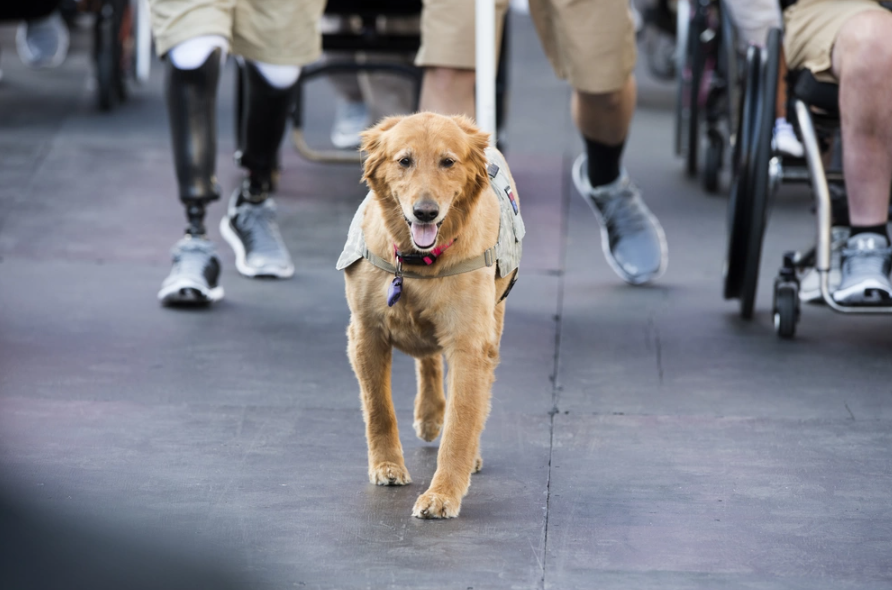 Americans with Disabilities Act (ADA) — Under the ADA, a service animal is defined as a dog that has been individually trained to do work or perform tasks for an individual with a disability. The task(s) performed by the dog must be directly related to the person’s disability. The dog must be trained to take a specific action when needed to assist the person with a disability. For example, a person with diabetes may have a dog that is trained to alert him when his blood sugar reaches high or low levels. A person with depression may have a dog that is trained to remind her to take her medication. Or, a person who has epilepsy may have a dog that is trained to detect the onset of a seizure and then help the person remain safe during the seizure. Service dogs are trained to calm a person with Post Traumatic Stress Disorder (PTSD) during an anxiety attack or perform other duties. The ADA makes a distinction between psychiatric service animals and emotional support animals. If the dog has been trained to sense that an anxiety attack is about to happen and take a specific action to help avoid the attack or lessen its impact, that would qualify as a service animal. However, if the dog’s mere presence provides comfort, that would not be considered a service animal under the ADA. The work or task a dog has been trained to provide must be directly related to the person’s disability. Dogs whose sole function is to provide comfort or emotional support do not qualify as service animals under the ADA.
Americans with Disabilities Act (ADA) — Under the ADA, a service animal is defined as a dog that has been individually trained to do work or perform tasks for an individual with a disability. The task(s) performed by the dog must be directly related to the person’s disability. The dog must be trained to take a specific action when needed to assist the person with a disability. For example, a person with diabetes may have a dog that is trained to alert him when his blood sugar reaches high or low levels. A person with depression may have a dog that is trained to remind her to take her medication. Or, a person who has epilepsy may have a dog that is trained to detect the onset of a seizure and then help the person remain safe during the seizure. Service dogs are trained to calm a person with Post Traumatic Stress Disorder (PTSD) during an anxiety attack or perform other duties. The ADA makes a distinction between psychiatric service animals and emotional support animals. If the dog has been trained to sense that an anxiety attack is about to happen and take a specific action to help avoid the attack or lessen its impact, that would qualify as a service animal. However, if the dog’s mere presence provides comfort, that would not be considered a service animal under the ADA. The work or task a dog has been trained to provide must be directly related to the person’s disability. Dogs whose sole function is to provide comfort or emotional support do not qualify as service animals under the ADA.
Assistance Dogs International (ADI) — ADI is a worldwide coalition of not-for-profit programs that train and place Assistance Dogs. ADI is a coalition of non-profit organizations that raise, train and place assistance dogs. ADI does not directly provide, train, certify or register individual assistance dogs or assistance dog teams, as that is the function of our member organizations. ADI certification is only available to assistance dog partnered teams that were trained by our accredited member programs. Assistance Dogs is a generic term for a guide, hearing, or service dog specifically trained to do three or more tasks to mitigate the effects of an individual’s disability. The presence of a dog for protection, personal defense, or comfort does not qualify that dog as an assistance dog. ADI does not recognize emotional support dogs. Most ADI accredited programs do not train, place or certify emotional support dogs.
ADI Accredited Members in VISN 20 — Accredited members are programs that have met the high standards set by ADI.
Alaska
PAWS for Purple Hearts — Paws for Purple Hearts is the first program of its kind to offer Canine Assisted Warrior Therapy, also known as Canine Assisted Therapeutic Intervention, to Service-Connected Disabled Veterans and active-duty military personnel. Geographical Area Served: Alaska, Idaho, Washington, Oregon, Montana, and Wyoming
Washington
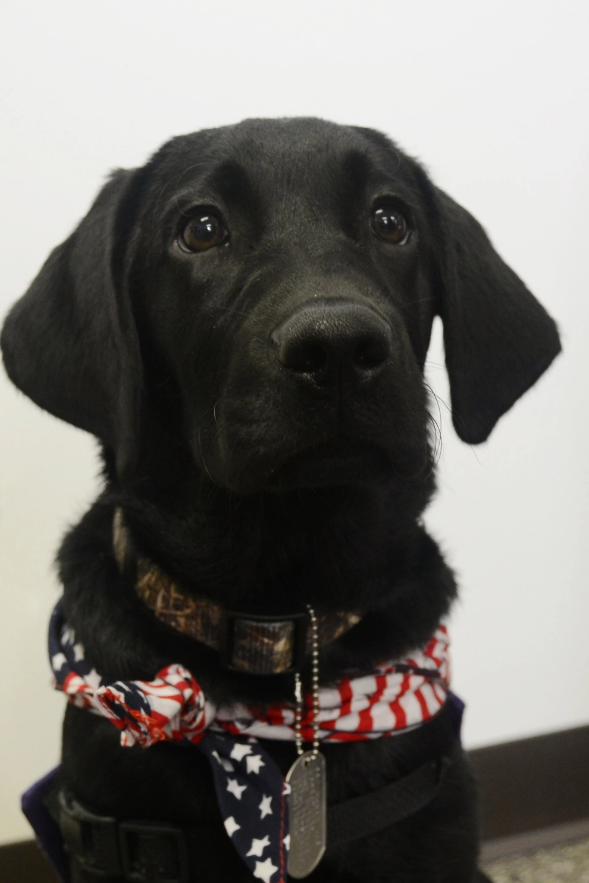 Brigadoon Service Dogs — Brigadoon Service Dogs Canines and Heroes for Independence program provides for Service-Connected Disabled Veterans who suffer from PTSD and TBI. Tactile stimulation can be very calming in stressful situations. In addition, the dog can be trained to nudge his partner to “snap” the Veteran out of a frozen moment caused by anxiety, or wake him up from a nightmare or night terrors by turning on a light. In public situations, the Veteran can give a cue for the dog to stand between himself and other people to reduce his anxiety. Geographical Area Served: Pacific Northwest
Brigadoon Service Dogs — Brigadoon Service Dogs Canines and Heroes for Independence program provides for Service-Connected Disabled Veterans who suffer from PTSD and TBI. Tactile stimulation can be very calming in stressful situations. In addition, the dog can be trained to nudge his partner to “snap” the Veteran out of a frozen moment caused by anxiety, or wake him up from a nightmare or night terrors by turning on a light. In public situations, the Veteran can give a cue for the dog to stand between himself and other people to reduce his anxiety. Geographical Area Served: Pacific Northwest
Summit Assistance Dogs — Summit Assistance Dogs has become one of the leading providers of assistance dogs in Washington State, and the need for our services continues to grow as more and more people recognize the benefits of these life-changing partnerships. Summit trains mobility assistance dogs to help people with various mobility challenges by retrieving dropped items, turning lights on and off, opening doors, tugging off clothing, and many other tasks to assist with the activities of daily living, increasing safety and independence, and providing companionship. Geographical Area Served: Washington, Idaho, and Oregon
Assistance Dogs Northwest — Assistance Dogs Northwest are committed to serving people in Washington, Oregon and Idaho with other special needs through our Facility Dog and Community Outreach Programs. Assistance Dogs Northwest’s Therapy Dog Teams visit Service-Connected Disabled Veterans with physical disabilities, amputations and PTSD at local agencies around the state. These teams are proud to serve the men and women who bravely serve our country. Geographical Area Served: Washington, Idaho, and Oregon
Oregon
PAWS Assisting Veterans Inc. — Service dogs provide immense support for Service-Connected Disabled Veterans to improve their quality of life. Our purpose at PAVE is to help more Veterans access the benefits of service dogs. By offering customized training and lifetime support, we make a tangible and significant difference in the lives of Veterans. If you’re a Service-Connected Disabled Veteran who is ready to regain your independence, contact us today to learn more. Geographical Area Served: Oregon, Idaho, Washington, California
Joys of Living Assistance Dogs — Providing skilled, devoted companions to support and assist Veterans, first responders, and others with disabilities, creating cohesive teams focused on building a life of greater freedom and independence. Geographical Area Served: Oregon, Washington, California, Idaho, and Nevada
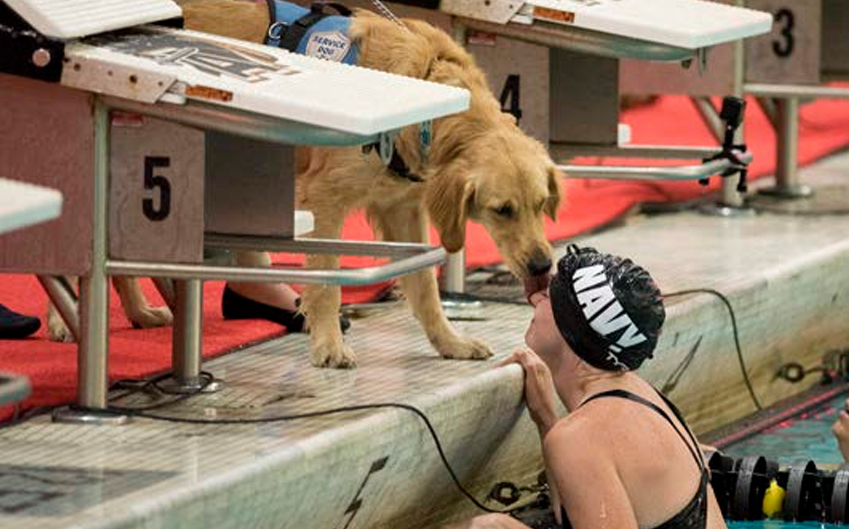 Puppies Assisting Wounded Servicemembers (PAWS) to Pilot in VISN 20 at VA Medical Center in Anchorage Alaska — VA is implementing a five-year pilot program to provide canine training to eligible Veterans diagnosed with Post-Traumatic Stress Disorder (PTSD) as an element of a complementary and integrative health program at 5 VA facilities including Anchorage, AK. Veterans are assisting in training candidate service dogs in canine obedience and needed specialized training. Certified dog trainers are leading these groups and most of the dogs being trained will become service dogs for fellow Veterans.
Puppies Assisting Wounded Servicemembers (PAWS) to Pilot in VISN 20 at VA Medical Center in Anchorage Alaska — VA is implementing a five-year pilot program to provide canine training to eligible Veterans diagnosed with Post-Traumatic Stress Disorder (PTSD) as an element of a complementary and integrative health program at 5 VA facilities including Anchorage, AK. Veterans are assisting in training candidate service dogs in canine obedience and needed specialized training. Certified dog trainers are leading these groups and most of the dogs being trained will become service dogs for fellow Veterans.
Who can participate—You may participate in the program if you meet the following eligibility criteria:
- You're a Veteran with PTSD, and
- You're enrolled in a VA medical center pilot site, and
- You've had an appointment with primary care, mental health, whole health, recreation therapy, or social work within the last 3 months, and
- You've been screened and approved by a VA evaluating provider
Referral Process—After you're referred to the PAWS Pilot Program, you'll first have a screening appointment with a VA clinician from the PAWS pilot team to make sure you meet the eligibility requirements. Once confirmed, you will be referred to the next available canine training group.
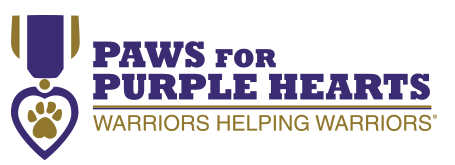 This is an outpatient program. Participating Veterans will attend training sessions at the Paws for Purple Hearts Service-Dog Organization in Anchorage. Paws for Purple Hearts improves the lives of America’s Warriors facing mobility challenges and trauma-related conditions such as PTSD and TBI by providing the highest quality assistance dogs and canine-assisted therapeutic programs. The PAWS pilot does not involve distributing service dogs. In this pilot, Veterans assist in training candidate service dogs in 8, weekly classes. Data gathered during the PAWS Pilot will be used to assess Veteran outcomes including satisfaction to determine whether to extend or make permanent the pilot program. Additional VA Medical Centers of the PAWS Act pilot program are located in West Palm Beach, Florida; San Antonio, Texas; Asheville, North Carolina; and Palo Alto, California.
This is an outpatient program. Participating Veterans will attend training sessions at the Paws for Purple Hearts Service-Dog Organization in Anchorage. Paws for Purple Hearts improves the lives of America’s Warriors facing mobility challenges and trauma-related conditions such as PTSD and TBI by providing the highest quality assistance dogs and canine-assisted therapeutic programs. The PAWS pilot does not involve distributing service dogs. In this pilot, Veterans assist in training candidate service dogs in 8, weekly classes. Data gathered during the PAWS Pilot will be used to assess Veteran outcomes including satisfaction to determine whether to extend or make permanent the pilot program. Additional VA Medical Centers of the PAWS Act pilot program are located in West Palm Beach, Florida; San Antonio, Texas; Asheville, North Carolina; and Palo Alto, California.
International Guide Dog Federation (IGDF) — The IGDF is comprised of 95 member organizations, whose purpose is to serve people who are blind or have low vision around the world, by training and providing Guide Dogs. A guide dog is a dog which has been specially trained to help people who are blind or visually impaired with their mobility. Assistance dog is a general term, which includes guide dogs, for any dog which has been specially trained to help a person with a disability to perform specific tasks. Guide dogs make an enormous difference to the lives of blind and visually impaired people. Not only do they bring the gift of independence, they also bring support, companionship and joy to people.
Sign up for email updates or access your subscriber preferences: https://public.govdelivery.com/accounts/USVHAVISN20/subscriber/new.
Use of these Materials and Finding VA Health Care
Please note that the health care information provided in these materials is for educational purposes only. It does not replace the role of a medical practitioner for advice on care and treatment. If you are looking for professional medical care, find your local VA healthcare center by using the VA Facilities Locator & Directory. This page may contain links that will take you outside of the Department of Veterans Affairs website. VA does not endorse and is not responsible for the content of the linked websites.
VA Web Disclaimers
Disclaimer of Endorsement: Reference herein to any specific commercial products, process, or service by trade name, trademark, manufacturer, or otherwise, does not necessarily constitute or imply its endorsement, recommendation, or favoring by the United States Government. The views and opinions of authors expressed herein do not necessarily state or reflect those of the United States Government, and shall not be used for advertising or product endorsement purposes.
Disclaimer of Hyperlinks: The appearance of external hyperlinks does not constitute endorsement by the Department of Veterans Affairs of the linked websites, or the information, products or services contained therein. For other than authorized VA activities, the Department does not exercise any editorial control over the information you may find at these locations. All links are provided with the intent of meeting the mission of the Department and the VA website. Please let us know about existing external links which you believe are inappropriate and about specific additional external links which you believe ought to be included.
Disclaimer of Liability: With respect to documents available from this server, neither the United States Government nor any of its employees, makes any warranty, express or implied, including the warranties of merchantability and fitness for a particular purpose, or assumes any legal liability or responsibility for the accuracy, completeness, or usefulness of any information, apparatus, product, or process disclosed, or represents that its use would not infringe privately owned rights.
Reference from this web page or from any of the information services sponsored by the VA to any non-governmental entity, product, service or information does not constitute an endorsement or recommendation by the VA or any of its employees. We are not responsible for the content of any "off-site" web pages referenced from this server.
Disclaimer: The sharing of any non-VA information does not constitute an endorsement of products or services on the part of the VA.
![]()
VA Regional Offices
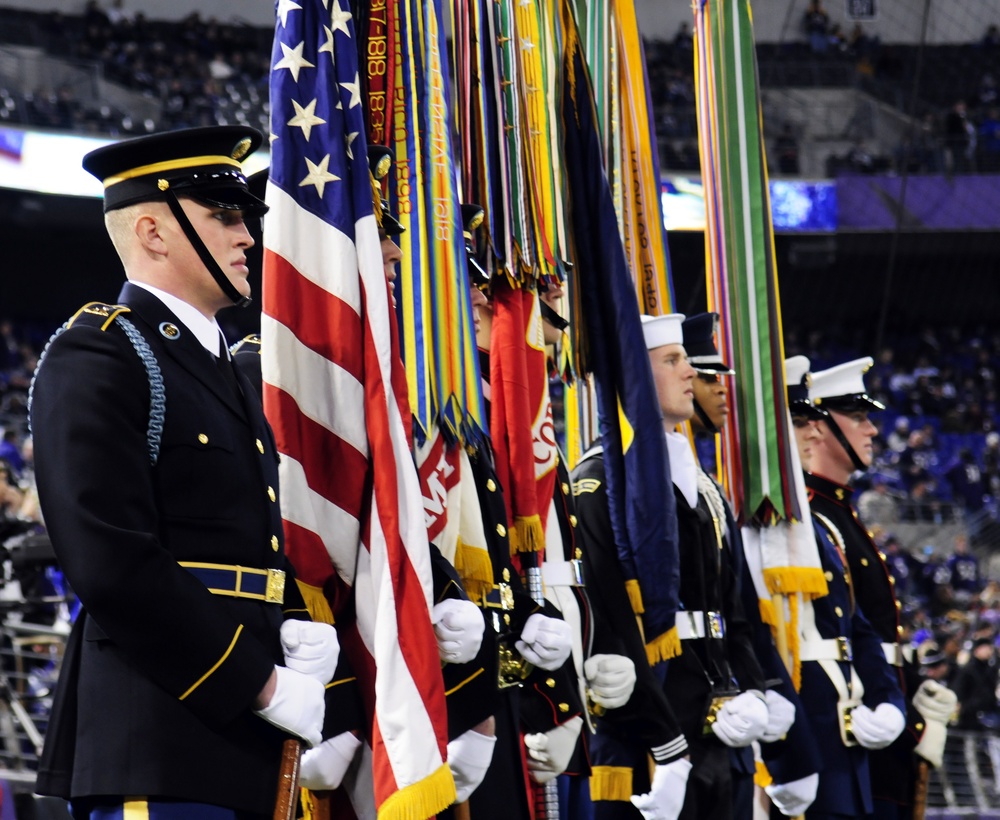 The Veterans Benefits Administration (VBA) helps service members transition out of military service, and assists with Veterans with education, home loans, life insurance and much more. Service members, Veterans, their families, and Survivors are invited to request information on VA Benefits including disability compensation, pension, fiduciary, education, Veteran Readiness and Employment (VR&E), Home Loans, and Insurance. In addition to information on VA Benefits Veterans may initiate an intent to file and request assistance with filing compensation and pension claims. Visit regional office websites to learn about the services the regional office provides, directions to the facility, hours of operation, and the leadership team that serves the regional office.
The Veterans Benefits Administration (VBA) helps service members transition out of military service, and assists with Veterans with education, home loans, life insurance and much more. Service members, Veterans, their families, and Survivors are invited to request information on VA Benefits including disability compensation, pension, fiduciary, education, Veteran Readiness and Employment (VR&E), Home Loans, and Insurance. In addition to information on VA Benefits Veterans may initiate an intent to file and request assistance with filing compensation and pension claims. Visit regional office websites to learn about the services the regional office provides, directions to the facility, hours of operation, and the leadership team that serves the regional office.
Find out if you can get VA health care as a Veteran
The following four categories of Veterans are not required to enroll but are urged to do so to permit better planning of health resources:
- Veterans with a service-connected (SC) disability rated at 50% or more.
- Veterans seeking care for a disability the military determined was incurred or aggravated in the line of duty, but which VA has not yet rated, within 12 months of discharge.
- Veterans seeking care for a SC disability only or under a special treatment authority.
- Veterans seeking health registry examinations. VA’s health registry evaluation is a free, voluntary medical assessment for Veterans who may have been exposed to certain environmental hazards during military service. The evaluations alert Veterans to possible long-term health problems that may be related to exposure to specific environmental hazards during their military service. VA has established several health registries to track and monitor the health of specific groups of Veterans. You may be eligible to participate in one or more of these health registries: Agent Orange Registry, Airborne Hazards and Open Burn Pit Registry, Gulf War Registry (includes Operations Iraqi Freedom and New Dawn), Ionizing Radiation Registry, Depleted Uranium Follow-Up Program, and Toxic Embedded Fragment Surveillance Center. Use the chart below to help determine your eligibility.
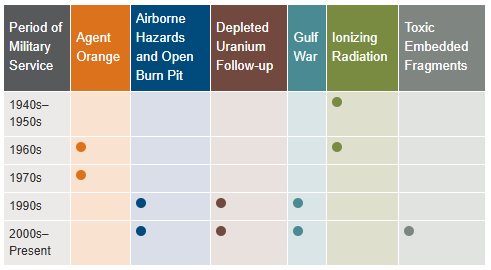
Find out how to apply for VA health care benefits as a Veteran or service member. For other mental health services, contact a VA medical center for information on eligibility and treatment options.
Community Care (Mission Act)
The MISSION Act became law in 2018, bringing the VA’s previous Veterans Choice Program to an end and establishing the Community Care Program. VA provides health care for Veterans from providers in your local community outside of VA. Veterans may be eligible to receive care from a community provider when VA cannot provide the care needed. This care is provided on behalf of and paid for by VA. Community care is also available to Veterans based on certain conditions and eligibility requirements, and in consideration of a Veteran’s specific needs and circumstances. VA offers urgent care services to eligible Veterans at in-network urgent care clinics to treat minor injuries and illnesses that are not life-threatening, such as colds, strep throat, sprained muscles, and skin and ear infections. Community care must be first authorized by VA before a Veteran can receive care from a community provider.
Vet Centers in VISN 20
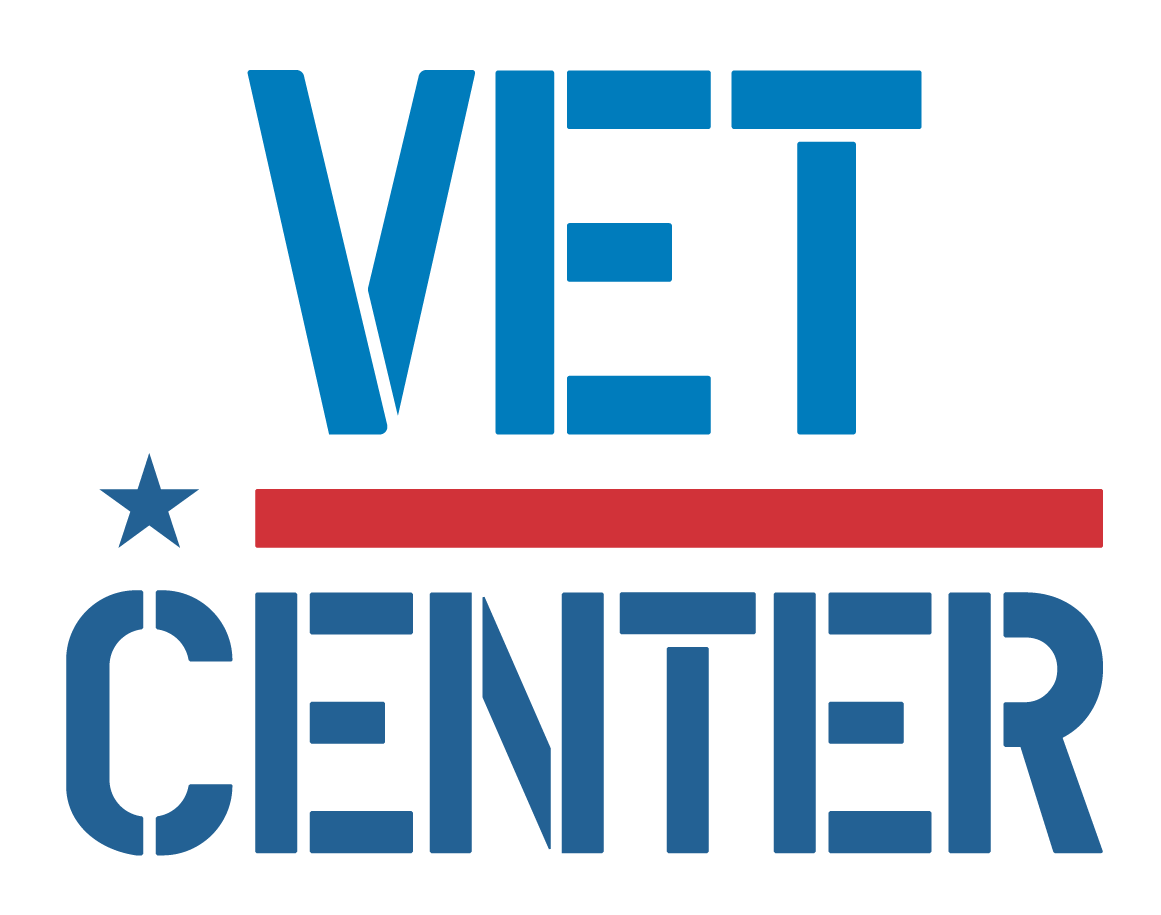 Vet Centers in VISN 20 are community-based counseling centers that provide a wide range of social and psychological services, including professional readjustment counseling to eligible Veterans, active-duty Army, Navy, Marine Corp, Air Force, Space Force, and Coast Guard service members, including National Guard and Reserve components, and their families. 1-877-927-8387 is an around the clock confidential call center where combat Veterans and their families can call to talk about their military experience or any other issue they are facing in their readjustment to civilian life. The staff is comprised of combat Veterans from several eras as well as families members of combat Veterans. This benefit is prepaid through the Veteran’s military service.
Vet Centers in VISN 20 are community-based counseling centers that provide a wide range of social and psychological services, including professional readjustment counseling to eligible Veterans, active-duty Army, Navy, Marine Corp, Air Force, Space Force, and Coast Guard service members, including National Guard and Reserve components, and their families. 1-877-927-8387 is an around the clock confidential call center where combat Veterans and their families can call to talk about their military experience or any other issue they are facing in their readjustment to civilian life. The staff is comprised of combat Veterans from several eras as well as families members of combat Veterans. This benefit is prepaid through the Veteran’s military service.
Alaska
| Anchorage Vet Center (Anchorage, AK) | Fairbanks Vet Center (Fairbanks, AK) |
| Kenai Vet Center Outstation (Soldotna, AK) | Wasilla Vet Center (Wasilla, AK) |
Idaho
| Boise Vet Center (Boise, ID) | East Idaho Vet Center (Idaho Falls, ID) |
Oregon
| Central Oregon Vet Center (Bend, OR) | Eugene Vet Center (Eugene, OR) |
| Grants Pass Vet Center (Grants Pass, OR) | Portland, OR Vet Center (Portland, OR) |
| Salem Vet Center (Salem, OR) |
Washington
Plan your trip to VA
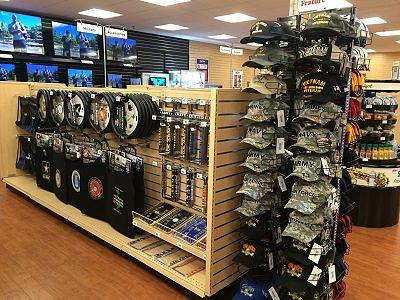 In 1946, Veterans Canteen Service (VCS) was established by law to provide comfort and well-being to America’s Veterans. With our many retail stores, cafés and coffee shops across the country, we serve those who have served our country. We are a self-sustaining entity providing merchandise and services to Veterans enrolled in VA’s healthcare system, their families, caregivers, VA employees, volunteers and visitors. We are honored to give back to the VA community through many programs established for the health and well-being of our nation’s heroes. Revenues generated from VCS are used to support a variety of programs, such as VA’s Rehabilitation Games, Fisher Houses, Poly-Trauma Centers for OIF/OEF/OND Veterans, disaster relief efforts, Substance Abuse Cessation, VA’s Homelessness initiatives, Women Veterans, Veteran Suicide Prevention and other activities.
In 1946, Veterans Canteen Service (VCS) was established by law to provide comfort and well-being to America’s Veterans. With our many retail stores, cafés and coffee shops across the country, we serve those who have served our country. We are a self-sustaining entity providing merchandise and services to Veterans enrolled in VA’s healthcare system, their families, caregivers, VA employees, volunteers and visitors. We are honored to give back to the VA community through many programs established for the health and well-being of our nation’s heroes. Revenues generated from VCS are used to support a variety of programs, such as VA’s Rehabilitation Games, Fisher Houses, Poly-Trauma Centers for OIF/OEF/OND Veterans, disaster relief efforts, Substance Abuse Cessation, VA’s Homelessness initiatives, Women Veterans, Veteran Suicide Prevention and other activities.
VCS operates over 200 Patriot Stores in Veterans Administration (VA) Medical Centers nationwide. Many of our stores have been recently updated and expanded to provide our customers with a modern, clean and comfortable shopping experience. Our stores welcome our customers with wider aisles, wood-like floors, enhanced lighting and directional signage. PatriotStores have expanded hours of operation to provide service for customers on weekends at most locations.
The Patriot Cafe is the best place in the VA Medical Center to enjoy delicious, freshly prepared breakfast or lunch served hot or cold each weekday. Providing Veterans, their families, VA employees, volunteers and visitors a place to relax and enjoy a meal or take-out for their convenience. With a wide variety of food from traditional comfort food, specialized menu selections and a large assortment of healthy choices; there is something for everyone's taste buds.
Hospital Service Directory
To find out whether there is a van near you use the Disabled American Veterans (DAV) Hospital Service Coordinator Directory to contact your nearest HSC for information or assistance. Please remember that the DAV Transportation Network is staffed by volunteers; therefore, it is unable to cover every community. The vans are driven by volunteers, and the rides coordinated by more than 133 Hospital Service Coordinators around the country. Our nation’s heroes travel around the globe to protect our freedoms—it’s only right that we return their dedication. Volunteering to drive a Vet ensures that even those living remotely from VA hospitals can make their appointments and never go without the treatment they need. Learn more about the DAV transportation network through the VISN 20 NewsFlash Resources section.
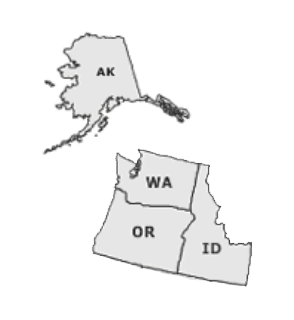 Today's VHA - the largest of the three administrations that comprise the VA - continues to meet Veterans' changing medical, surgical, and quality-of-life needs. VHA is the largest integrated health care system in the United States, providing care at 1,321 health care facilities, including 172 VA Medical Centers and 1,138 outpatient sites of care of varying complexity (VHA outpatient clinics) to over 9 million Veterans enrolled in the VA health care program. There are 18 Veterans Integrated Service Networks (VISNs) in VHA operating as regional systems of care to better meet local health care needs and provides greater access to care. In the Pacific Northwest, VISN 20 serves Veterans in Alaska, Oregon, Washington, most of Idaho, and one county each in California and Montana. Spanning 23% of the US land mass, VISN 20 is the largest geographic region of VA. Operating across three time zones over 817,417 square miles, VISN 20 is home to 273 federally recognized American Indian and Alaskan Native tribes. According to DoD, American Indians and Alaska Natives have one of the highest representations in the United States Armed Forces. VA consults with American Indian and Alaska Native tribal governments to develop partnerships that enhance access to services and benefits by Veterans and their families. VA is committed to ensuring that Native American Veterans and their families are able to utilize all benefits and services they are entitled to receive. As of the end of FY2024, 39% of VISN 20 enrollees resided in rural or highly rural areas.
Today's VHA - the largest of the three administrations that comprise the VA - continues to meet Veterans' changing medical, surgical, and quality-of-life needs. VHA is the largest integrated health care system in the United States, providing care at 1,321 health care facilities, including 172 VA Medical Centers and 1,138 outpatient sites of care of varying complexity (VHA outpatient clinics) to over 9 million Veterans enrolled in the VA health care program. There are 18 Veterans Integrated Service Networks (VISNs) in VHA operating as regional systems of care to better meet local health care needs and provides greater access to care. In the Pacific Northwest, VISN 20 serves Veterans in Alaska, Oregon, Washington, most of Idaho, and one county each in California and Montana. Spanning 23% of the US land mass, VISN 20 is the largest geographic region of VA. Operating across three time zones over 817,417 square miles, VISN 20 is home to 273 federally recognized American Indian and Alaskan Native tribes. According to DoD, American Indians and Alaska Natives have one of the highest representations in the United States Armed Forces. VA consults with American Indian and Alaska Native tribal governments to develop partnerships that enhance access to services and benefits by Veterans and their families. VA is committed to ensuring that Native American Veterans and their families are able to utilize all benefits and services they are entitled to receive. As of the end of FY2024, 39% of VISN 20 enrollees resided in rural or highly rural areas.
VA Puget Sound Health Care System (VAPSHCS) serves Veterans from a five-state area in the Pacific Northwest with two main divisions: American Lake VA Medical Center and Seattle VA Medical Center. Veterans Medical Centers are also located in Spokane, Vancouver, and Walla Walla. VA Outpatient Clinics and Vet Centers are located in Bellingham, Bellevue, Bremerton, Edmunds, Everett, Federal Way, Lacey, Mount Vernon, Olympia, Port Angeles, Puyallup, Richland, Renton, Silverdale, Seattle, Spokane, Union Gap, Vancouver, Walla Walla, Wenatchee, and Yakima.
VA Portland Health Care System (VAPORHCS) serves Veterans in Oregon and Southwest Washington with two main divisions: Portland VA Medical Center and Vancouver VA Medical Center. Veterans Medical Centers are also located in Roseburg, White City, and Vancouver, Washington. VA Outpatient Clinics and Vet Centers are located in Astoria, Bend, Boardman, Brookings, Eugene, Fairview, Grants Pass, Hines, Hillsboro, Klamath Falls, LaGrande, Lincoln City, Newport, Portland, Salem, The Dalles, and West Linn.













